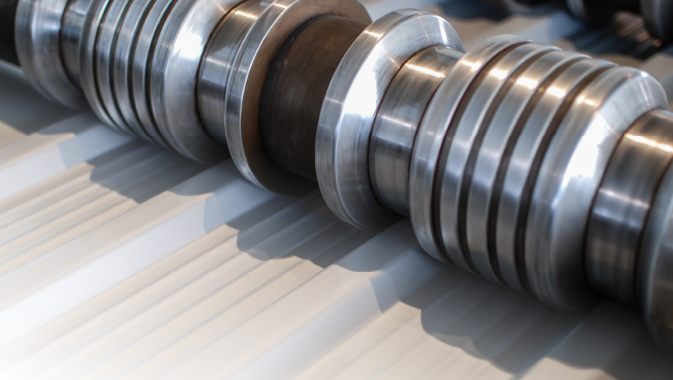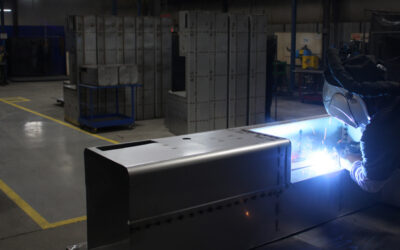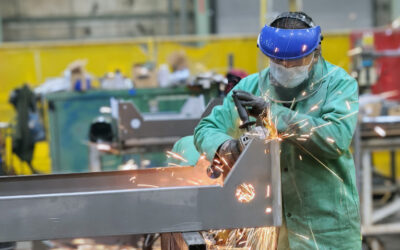Samson Roll Formed Products Company is a contract roll forming operation in the Chicago metropolitan area and is one of the oldest companies of its kind in the United States.
~
The company was founded in 1946 by a tool and die maker named Marty Samson. Together with partners Les Lund and Rubin Lyons he grew the company, by the 1970s, to be one of the leading roll forming operations in the United States. Since the company’s genesis, it has been built on a foundation of technical expertise. The leadership assembled a team of highly skilled engineering experts and developed a wide range of tooling capable of roll forming thousands of specialized shapes for various applications.
Roll forming is a sheet metal fabrication process where long, narrow strips of coiled steel, aluminum, and other metals are fed continuously into heavy forming rollers that shape them. The end result is much like a beam with a uniform cross-section determined by the shape of the forming rollers. To visualize the equipment you can imagine a pasta maker, except rather than cutting the steel, it bends it. For example, if you wanted to create long brackets with a ninety degree bend down the middle of their length, you would take a narrow strip of steel and feed it through a pair of rollers set one on top of the other. The lower roller would be contoured like an upward point with a ninety degree angle, and the upper roller would be contoured with a space for the lower roller to fit into. The steel would be fed between them, conforming to the shape of the tooling continuously and then cut to length afterward. This example is simplified for the sake of explanation; in an actual roll forming line the steel would be bent in steps, each pair of rollers bending it slightly more, resulting ultimately in a ninety degree angular bend down the center.
Within Samson’s facility there are roughly forty roll forming lines and with them the company is capable of forming everything from simple angles as in the above example to complex multi-phase shapes that require great care and expertise. In order to complement its roll forming services, the company has invested in a great deal of ancillary equipment that enables it to offer many value added fabrication options. It can punch holes in steel products with stamping equipment, cut pieces to size, bend, and assemble components to suit many varied applications. Samson Roll Formed Products has the capacity, the equipment, and the skill set to satisfy the needs of a broad range of customer demands.
Roll forming has a number of advantages over alternative processes such as press braking and extrusion. Press braking is a forming process where a sheet of metal is trapped between an upper and lower tool and downward pressure is applied to bend it into the desired shape. This process requires the equipment to open and close for every press, unlike roll forming which operates continuously. Press braking is much less efficient, results in less consistent results, and creates trim scrap that is nonexistent within a roll forming setup. In one example, Samson saved a customer in the contract furniture industry nearly fifty percent on cost by converting a press brake operation to roll form.
Another alternative fabrication method is extrusion. This is a process used primarily for aluminum fabrication whereby the metal is forced through a die with the desired cross section. Unlike extrusion, roll forming can be used to shape nearly any metal rather than only soft metals like aluminum. Not only does roll forming increase the range of materials the fabricator can work with, but it also enables it to use materials that have been pre-treated in a number of ways. This is a key benefit of the roll forming process as it gives the fabricator the ability to work with metal that has been perforated, pre-coated, pre-painted, or pre-plated. While other forming methods require that these processes are performed after the product has been shaped, roll forming allows for these features to be added in advance, which can be much easier and much less expensive.
Roll forming produces high quality results with very tight tolerances of around one one-hundredth of an inch. Nearly any metal that can be obtained in coils can be formed with very high accuracy, and Samson Roll Formed Products are among the most precise in the market. Compared to alternatives, roll forming is more efficient, creates more uniform results, and saves the customer money at the end of the day.
Samson is committed to developing top quality products. The company employs the latest technology, and engineering staff are trained on a variety of quality control processes to ensure that any problems are identified and solved quickly. Some of the quality systems used at Samson include capability studies, which help engineers determine whether or not customer-supplied specifications are feasible given the physical limitations of the company’s manufacturing equipment, and statistical process control (SPC), which is a process for collecting and measuring quality data during the manufacturing process to ensure that a product fits within the predetermined specifications before delivering it.
Beyond these, Samson company members are collaborators and problem solvers. Pareto analysis is a deliberate approach to efficient problem solving employed by Samson experts to prioritize problems so they can be solved in the most effective order. Samson is committed to continually improving its internal processes in order to reduce costs and create value for customers.
Samson products have applications in a variety of industries including appliances, automotive, construction, electronics, lawn and garden, office furniture, sports and recreation, and more. It offers products in the many stock shapes that are standard to the industry such as simple angles and arches, various channels, and round and square tubing. These end up in shelf ladders, appliances, patio and office furniture, drawer slides, cars, and much more.
For round and square tubing, the company offers standard open seam, where both sides of the seam are left separate and open, and butted seam, where the sides are butted together and kept closed. Samson is also one of the largest manufacturers of lock seam tubing. Commonly used in small residential flagpoles, maypoles, and racks, the seam on these tubes clips together mechanically, rather than being electrically- or laser-welded, and holds with more strength than the other options.
One interesting application of a Samson Roll Formed product can be found in the solar water heating industry. This product is a parabolically shaped channel that a pipe is run through. The channel is made out of a reflective aluminum material so that when solar rays contact the inside of the channel, they are all reflected onto the pipe, heating the water inside. The roll forming process enables the material to be formed with a protective PVC plastic coating to prevent damage to its reflective surface, a feature that wouldn’t be possible with alternative processes. The customer in this case was initially using aluminum extrusion to create these channels, and Samson engineers worked closely with them to transition to roll forming, which allowed for a much more reflective and better performing product. The result is a system that heats water to heat a building, saving the occupant on energy costs.
Over more than half of a century, Samson Roll Formed Products has become a leader in its industry. Roll forming is a process that is very efficient, very consistent, and very cost effective, and Samson is the choice provider of these services in the United States.













